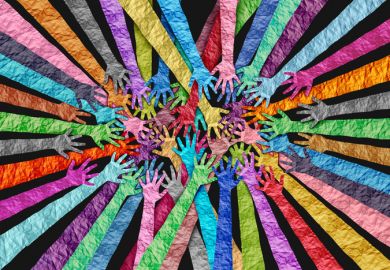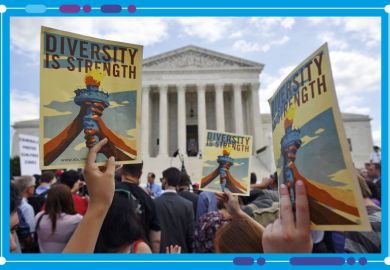Accepting the ethnicity graduation gap amounts to a “macroscopic microaggression”, according to a new US university leader who is seeking to address the issue.
One of Justin Schwartz’s main priorities since taking over as chancellor of the University of Colorado Boulder last summer has been to investigate the graduation gap between ethnicities.
While the majority of Asian students (75 per cent) and white students (69 per cent) in the US complete their college degree in six years, this is true for only half of Hispanic and 44 per cent of black students, the latest data from the National Student Clearinghouse Research Center shows.
When he asks people why the gap persists, Schwartz, a systems engineer, said he gets “lots of legitimate anecdotal hypotheses”, but he wants hard evidence.
“I think that accepting the gap as ‘just the way it is’ is really a macroscopic microaggression,” he said.
“I want to understand as best we can quantitatively, what are the things that lead to our students leaving?”
It could be that they go from living in student accommodation on campus to off campus, and feel less sense of belonging; or they may not be able to afford to live in Boulder; or they may not get onto the major they hoped to. “Each of those has very different tactical responses,” said Schwartz, who was previously executive vice president and provost at Pennsylvania State University.
In case it turns out that living off campus is the issue, he has tasked another team with costing up more dormitory provision. “Other universities have gone to models where all students were required to be in the dorm for two years, and they see an immediate effect on graduation rates,” he said.
CU Boulder has already found that introducing accommodation specifically for first-year engineering students has been a success.
“Maybe they do well because they were qualified to get onto the engineering honours, and it’s self-selecting, but maybe they also do well because engineering is one of those fields where working in a group really makes a huge difference, particularly for minoritised students,” said Schwartz.
Students who join the National Society of Black Engineers also have a higher rate of graduation, according to Schwartz. “They weren’t the isolated black engineering student. They were the black engineering students who had that safe space. So they’re doing their homework without identity threat, where they feel comfortable showing they don’t know how to do something.”
Resources on equity, diversity and inclusion in higher education
But increasing the number of minority students and improving the culture so they feel like they belong are two different things, and often a “catch-22” situation, he said. “You really need to address your culture before you can address your demographic numbers, but you can’t really address the culture until you’ve addressed the demographic numbers.”
Schwartz is also gathering data from other universities. He is inspired by the case of Georgia State University, which in 2022 announced that it had closed equity gaps, with black and Latinx students now graduating at the same or higher rates as the overall student body.
“I literally had my assistant order 20 copies of the book that was written about what happened at Georgia State,” said Schwartz, while acknowledging that the solutions for CU Boulder won’t be the same. “It’s the mindset of: understand the problem, try things and it’s ok if what you try doesn’t work.”
One area he will explore is how the university treats students who cannot pay their fees or are late to pay. Many universities prevent students from registering for the next term’s classes if they owe money. When Schwartz was at Penn State, they increased the amount of debt that triggers this.
“It gets them progressing, and it also helps them feel belonging, because we’re in this together,” he said. “To solve big challenges, you need to understand not just the big level, but the nuance. Because it’s usually the nuanced details that really make the difference.”
Before Schwartz joined CU Boulder there were accusations of a racist culture in the School of Education. A document written by two black female students circulated online, accusing the department of pushing out four women of colour faculty.
Schwartz said he discussed the allegations with the faculty’s new department head and planned to get to the root of the problem. But how does a leader get an accurate understanding of a department’s culture, when staff will always try to present a good image to the boss?
“I like to think that I have a certain level of experience and savvy in hearing people, right? It’s a lot of listening,” he said. “There are subtleties and word choices that a lot of people won’t pick up on that make a big difference.” He added: “If someone says, ‘this is how we handle it’, I’m thinking, if the demographic of the situation was different would the response have been different? Is a black female viewed as a bully, whereas a white male would have been viewed as a strong leader?”
He said another concern is that when the word gets out that a unit is anti-black, then black members are more likely to interpret situations as biased. “So we need to have conversations around both allyship and grace. If someone is trying to get to know you in a genuinely caring way, but says something in a way that shows a lack of experience, do you show grace or do you show anger? If you're coming off of 10 bad experiences, who can blame you for showing anger? But that’s the moment where grace is most important.”
In his first few months in office, Schwartz was able to “double down” on diversity because Colorado was not one of the US states that had enacted anti-DEI laws restricting what universities could do to improve diversity. But one of the latest executive orders from Donald Trump’s new administration aims to end “illegal” diversity, equity and inclusion policies – a move that does not have an immediate impact on programmes at colleges and universities, but experts worry could have a chilling effect.
Speaking to THE before Trump’s election, Schwartz said: “My mindset on this is, I'm not going to lead in fear. My commitment is we are going to live on principles and values, and we are going to keep doing that work, because it’s both the morally right thing to do, and the social justice thing to do. We’re a state university, and we should reflect the diversity of Colorado, which we don’t yet. And it’s also damn good business sense.”
He might even use the anti-DEI laws in other areas to his advantage. One of the top states that CU Boulder recruits from is Texas, which has implemented anti-DEI laws. “So the question is, does it give me the opportunity to more aggressively recruit in Texas?” he said. “Should I be thinking about more aggressively recruiting in Florida?”
It could be a stronger tool for recruiting faculty than recruiting students, he noted.” Trying to recruit low-income students from Texas could be a challenge because it’s expensive to move out-of-state, but “why, if you were minoritised faculty, do you want to stay in a hostile environment rather than come where you’re embraced?”
The business case for diversity is important, too: “In a world of declining high school-age population, why would I not work to attract all of them?”
Register to continue
Why register?
- Registration is free and only takes a moment
- Once registered, you can read 3 articles a month
- Sign up for our newsletter
Subscribe
Or subscribe for unlimited access to:
- Unlimited access to news, views, insights & reviews
- Digital editions
- Digital access to THE’s university and college rankings analysis
Already registered or a current subscriber?








